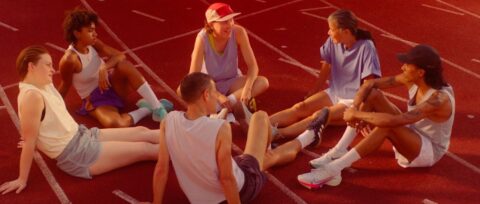I’ve been inside the Berlin Olympiastadion three or four times, around it several more. It’s half an hour’s walk from my flat. I’ve always been struck by the solemnity of the building, its solidity and strength — a begrudging testament to the engineering prowess of the National Socialists. But the limestone design is rotting from the inside and requires constant maintenance to lay host to Hertha Berlin games and (very loud and very annoying) Coldplay concerts.
As a tribute to white supremacy, a fallacy upended by Jesse Owens one-upping his Aryan boys at the 1936 Olympics, it’s also a tribute to rotting and outdated gender norms, codified in binary terms by the sporting games themselves, with neat distribution between male and female events. Given that the Nazis famously burned decades worth of trans literature as part of their purifying project, perhaps it’s not a reach to state that transphobia is a natural product of white supremacy.
Mixing archive-like footage, robotic, essayistic yet plain voiceover, Zelig-like (Woody Allen, 1983) trickery and live testimony, Julia Fuhr Mann’s debut film Life Is Not a Competition, But I’m Winning (2023) investigates these links between white supremacy and transphobia, moving smoothly between the women trailblazers erased from sporting history to modern day trans, intersex and cis women alike subject to discrimination and medical policing. Serious throughout, it moves between lecture and testimony, stronger when allowing its subjects to speak for themselves, on shakier ground when simply relaying facts and theories about track and field events.
According to the production notes, Fuhr Mann’s project — produced by the University of Television and Film Munich and Schuldenberg Films — was made solely by women and queer people. Centring the perspective away from the usual talking heads and bad-faith debates about trans women in sports, it is a spirited and more utopian look at the topic, imagining a different way of looking at non-normative bodies just as the old certainties are slowly rotting away.
For example, her subjects re-imagine the 1928 women’s 800-metre race. Marking the first participation of women in the race, the fall of one of the participants — natural after sprinting for your life two rounds around the track — led to the women’s event being cancelled until 1956. Lina Radke, Germany’s first-ever Olympic winner, was not celebrated. But in this imaginative doc, she is given her fair due.
90 years later, South African runner Caster Semenya wowed the world by winning the same event. We all know what happened next: endless speculation about her femininity, sparking the kind of debate that never plagued the perfect specimen, Michael Phelps. We do not hear her testimony, but Ugandan runner Annet Negesa runs in the Mommsenstadion (home to far left and Jewish-friendly club Tennis Borussia) while outlining horrific treatment for her natural testosterone levels. Both intersex women, the film shows how Nazi ideals have been passed from one generation to the next. A bit like the Olympic torch relay; also invented by the Germans.
It all sounds quite heavy, but passes lightly over a brisk 75 minutes, filled with visual inventiveness and a mixture of aspect ratios and film grains.
Some odd choices stand out: I found the voiceover highly distracting. It’s either generated via AI or sounds a hell of a lot like it, often doubling voices to create an unnerving dramatic effect while lacking the emotion needed to give this piece a dramatic heart. Also distracting is a brief sequence in the Friedrich-Ludwig-Jahn-Sportpark, the intermittent home of Dynamo Berlin, a team unfortunately supported by literal neo-Nazis. While many places, once laying host to the great horrors of history, can be rebuilt and re-imagined, filming in that exact same space while it still lays host to Nazi chants (I’ve unfortunately seen them myself) seems extremely ill-advised. Yet, perhaps for people who haven’t seen nearly every major team in Berlin play football, this is a minor note, and easy to pass over. I hope this largely successful polemic can change rotting minds and hearts.
Redmond is the editor-in-chief of Journey Into Cinema.
